Thanks for your support! If you make a purchase using our links in this article, we may make a commission. And, as an Amazon Associate, I earn from qualifying purchases. See the full disclosure here.
Updated April 13, 2024
RV hookups supply your RV with electricity, water, and a sewer drain so you can fully use and enjoy your RV. Sometimes full hookups will include Cable TV or WiFi.
Some campsites offer full hookups which include water, sewer, and electricity. Others only offer partial hookups which could include just water, or maybe just water and electricity. Other campsites offer no RV hookups. Camping with no hookups is also known as boondocking or dry camping.
In this article, we will discuss each type of RV hookup in more detail and how to use them. We also discuss some related questions surrounding RV hookups. Finally, we include our RV Setup Video at the end of the article so you can see how Mike and Susan use all of the hookups with their RV!
- Do RVs Come With All Of The Hoses And Connections For Hookups?
- Electric RV Hookups
- RV Water Hookups
- RV Sewer Hookups
- Cable TV Hookups
- RV WiFi
- RV Dump Stations
- What Does Full RV Hookups Mean at an RV Park?
- What are Partial RV Hookups?
- Do All Campgrounds Have RV Hookups?
- Are There RV Hookups in National Parks?
- Are There RV Hookups in State Parks?
- Do Walmarts Have RV Hookups?
- Can You Install RV Hookups At Your House?
- 4 FAQs About RV Hook-Ups
- See How Mike and Susan Use Full RV Hookups!
- Final Words About RV Hook-Ups
- Related Reading:
- Mike Scarpignato – Bio
Do RVs Come With All Of The Hoses And Connections For Hookups?
The RV itself doesn’t necessarily come with all the hoses and connections for hookups. Usually, these are things the dealer may or may not offer as sort of a package deal, along with things like a full tank of gas (in the case of motorhomes).
Some dealers may offer a basic starter kit that includes hoses and things of that nature. However, these are infamously renowned for being relatively cheap and you should probably pay to replace them after a few trips to the campground.
While they’re probably okay for a few trips, the quality is often low enough that you shouldn’t depend on them in the long term. For the best outcome, try to negotiate these things in, and get as much out of the deal as possible. Always take careful note of everything that’s included in the purchase and make sure you have it at day’s end.
Electric RV Hookups
Often called shore power, electric hookups can either be 15, 30, or 50 amps. You likely received the correct power cord for your rig when you purchased the RV but you need to know what type of power you need.
When you get to your destination, you simply plug the power cord into the outlet at your RV spot. Remember to shut down the power at the source and power down your electronics before you plug in.
If your RV requires a 50 amp to power all your inside goodies and the park only provides 30 amp, you can manage but you will not be able to run everything at once. You will also need a converter.
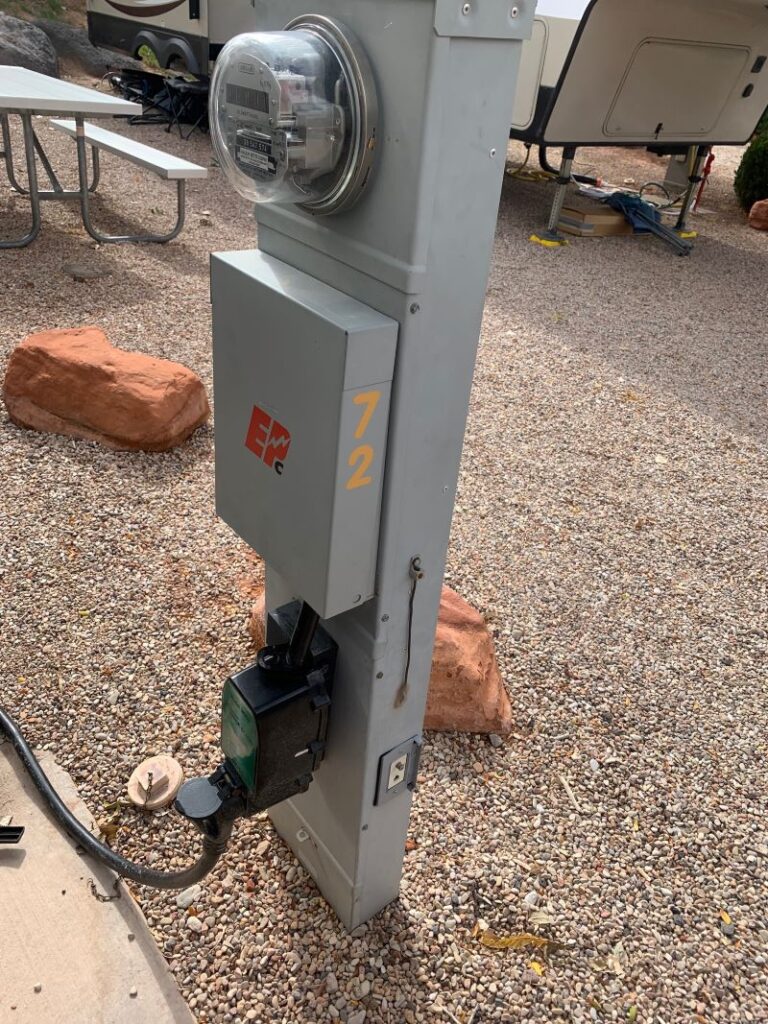
RV Water Hookups
Water is provided from a spigot, also at your site. Be sure to use a verified dedicated drinking water hose and not a garden hose that can contain harmful chemicals. You may need a heated hose for colder climates. The water from the spigot goes to your sinks, shower, toilet, etc. in your rig.
But you really shouldn’t just hook your fresh water drinking hose up to your RV. You should also use a water pressure regulator and a water filter system before allowing any water to enter your RV through the City Water connection on your RV.
Check out the Related Reading articles at the end of this article to learn more about water hoses and water filters.
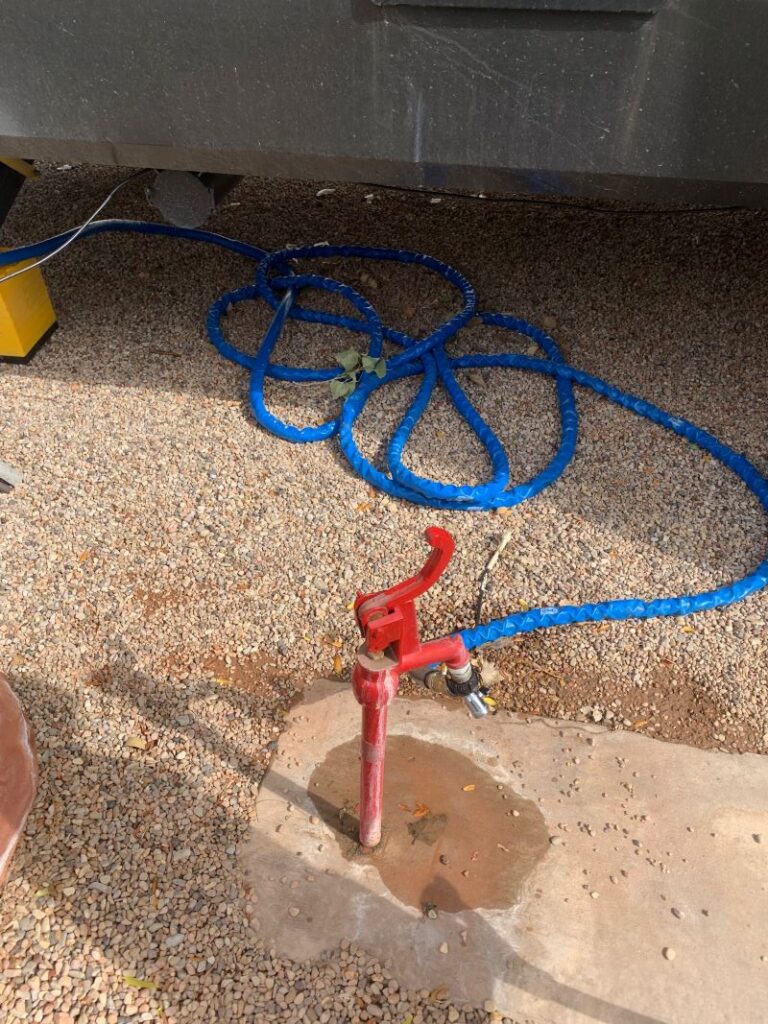
RV Sewer Hookups
The sewer is where your sinks, toilet, and shower wastewater will go. These go into the black water tank, from the toilet, and the gray water tank from the sinks and shower. Never dump any wastewater on the ground.
Dumping black water on the ground is illegal! It must be dumped into a septic or sewer system. Bacteria and harmful diseases are present in the wastewater.
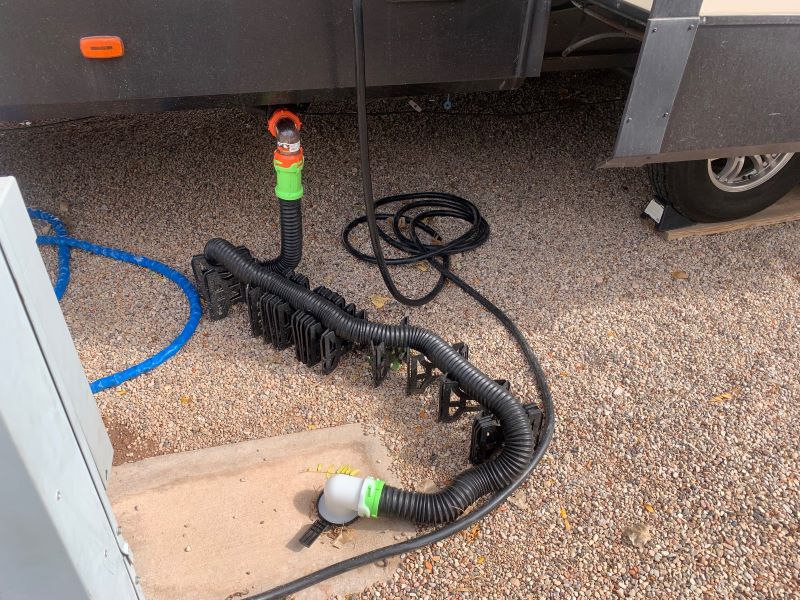
Cable TV Hookups
Cable TV is an amenity that is not always included at a full hook-up site. Some long-term parks allow you to hardwire Cable TV to your rig, but most are simple plug-and-play. If you are staying long-term, you may have to call the cable company to get your service hooked up.
We have a mobile antenna system that is very easy to hook up and use at our different campsites so we don’t normally utilize any cable provided.
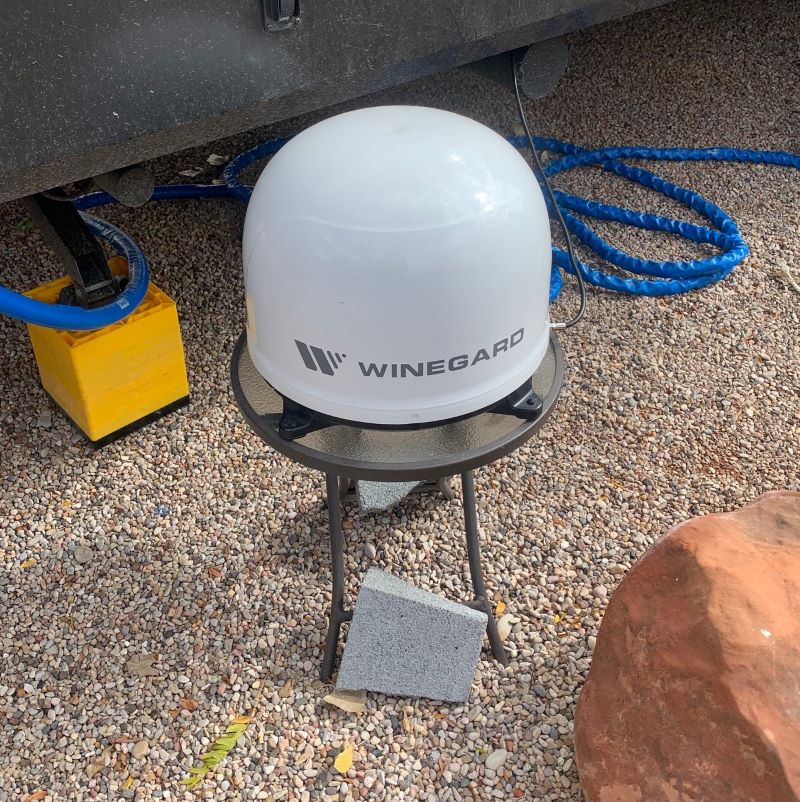
RV WiFi
WiFi is a service provided at most RV parks. However, signal strength depends on where you are located in the park, whether the park has many well-placed signal boosters, and the number of people using the WiFi at the same time.
I would not rely on this option if you need to do a work Zoom call. Sometimes you can get a better signal at the park’s office if you have to use the WiFi.
For more information about finding internet while on the road, check out our article called Internet For RVing: What Are Your Options?
RV Dump Stations
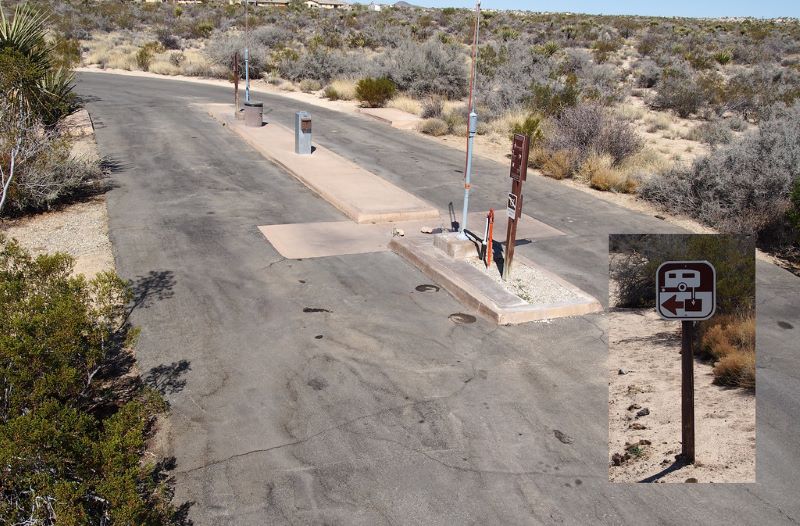
If an RV park does not have a sewer hookup at your site it might have a common dump station. You simply drive or pull your rig to the dump area and empty your tanks just like you would if you were at a campsite.
Some RVers carry a “blue boy” or small wagon that they fill with black or gray water and take to the dump station. This way, they don’t have to move their RV. Other parks utilize a “honey wagon” that comes by their site once a week or so and dumps their tanks for a fee.
What Does Full RV Hookups Mean at an RV Park?
Full RV hookups mean electric, water, and sewer can be accessed at your site. You will likely pay more than a campsite with limited amenities. Aside from the hookups, many high-end RV parks provide other amenities such as cable TV and WiFi.
What are Partial RV Hookups?
Partial RV hookups include water and/or electricity but not a sewer hookup. In many cases, a dump station or honey wagon is available at a campground with partial hookups.
But this is not always the case. Some campgrounds do not have a dump station which means you must find a place to dump your tanks outside of the campground.
Do All Campgrounds Have RV Hookups?
Not all campgrounds provide RV hookups, although most do. Do your research before booking your site so you know exactly what you are getting at any given park.
And many campgrounds offer a variety of hookup sites. For example, a campground may offer full hookup sites, partial hookup sites, and no hookup sites all within the same campground.
Are There RV Hookups in National Parks?
There are some national parks that have RV hookups but those are limited. Be sure you know which campgrounds within the park offer hookups. For example, Yellowstone National Park has 12 campgrounds but only 1 offers full hookups.
Be aware that most of the national parks have length limits of 25 feet. You might not be able to stay if your rig is more than 25 feet long.
Are There RV Hookups in State Parks?
Most state parks offer a minimum of electricity at each site so you will have to utilize the fresh water in your tanks and dump your wastewater at a dump station. When we arrive at a State Park we use the community spigot to fill our fresh water tank so we have water during our stay.
A few State Parks do offer full hookups but this is rare. While state parks may not offer a lot of amenities, they usually provide quiet, shady sites away from other RVers.
Do Walmarts Have RV Hookups?
Walmarts do not have RV hookups, and parking is usually first come, first served. When parking at a Walmart, always inquire whether RVs are allowed in the parking lot.
There are a few things to consider when parking at a Walmart. Utilize the store lot for an overnight but don’t make yourself at home for a family vacation. Don’t set up chairs and if you can avoid it, don’t extend your slide-outs.
Always be courteous, pick up any trash you may have around your rig, and leave it in good shape for the next vehicle that will be there. Many Walmarts no longer allow rigs to park there overnight because of people who abused the privilege.
Check out our article called FREE RV Parking Overnight At Walmart (Rules & Safety) for all the details about staying overnight at a Walmart.
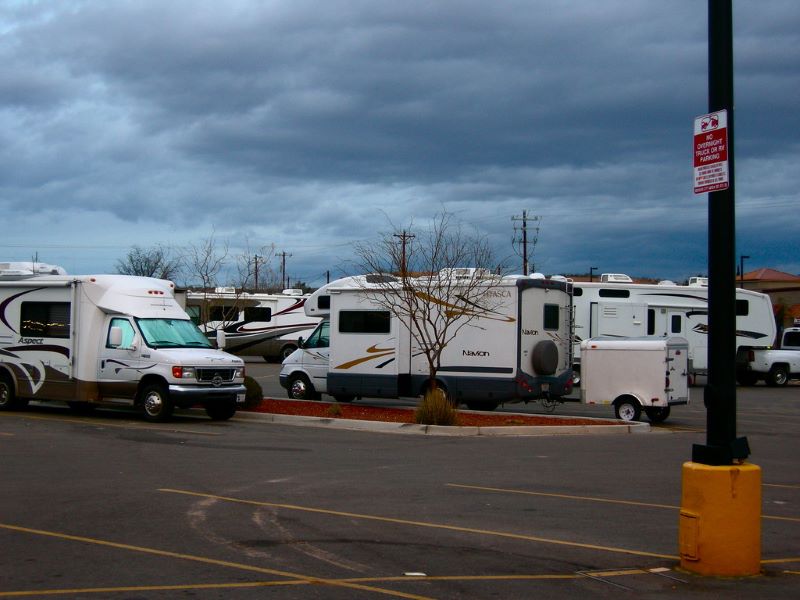
Can You Install RV Hookups At Your House?
You can install RV hookups at your house, and it’s not too expensive, so long as you take care of some of the components on your own. You may want to hire an electrician for the power hookup, and that will cost you around a grand.
Installing a water hook-up will cost between $25 and $50 if you do it yourself and a lot more if you hire someone, so it’s best to tackle that one on your own if capable. A DIY sewer connection may cost anywhere between $0 and $500.
If you want to install RV hookups for more than just a single RV in your driveway, you need to add in the cost of a pad and remember that the price increases the farther the pad is from your home.
4 FAQs About RV Hook-Ups
1. Can You Dump Grey Water On The Ground?
It’s illegal to dump grey water on the ground in most states, with a few exceptions here and there. These exceptions may allow it on your own, private property. For the most part, you will have to dump grey water at approved dumping stations and nowhere else.
There are many reasons behind this, but the most important ones include the potential for environmental hazards. There’s no way of knowing what chemicals may or may not be inside grey water, and if everybody is dumping it everywhere, it poses a significant problem.
Also, depending on what’s in the grey water, it may attract the wrong kind of wildlife, wildlife that is better left to its own devices and not up close and personal with other campers
2. Do Harvest Hosts Locations Have Hookups?
Most Harvest Host locations do not have hookups, but some allow the use of a generator. The advantage of a Harvest Host is that rather than a parking lot, you can stay at these places and enjoy the business or features of the host. These can include wineries, farms, breweries, and more.
We’ve stayed at several Harvest Hosts and always enjoyed what we found there. We stayed at a dairy farm and were able to purchase milk and cheese. Once we stayed at the home of a woodworker who gave us a demonstration and invited us to join him and his wife at a campfire that evening.
We also stayed at a beautiful winery and partook in a wine tasting. To learn about these places, you pay Harvest Hosts a yearly fee and then you pay nothing to stay at the locations. It is suggested that you make a purchase to help support the business when you are there.
Check out our article and video about Harvest Hosts called Harvest Hosts – A Great Way to Camp for Free! for lots of helpful info and a discount if you want to join!
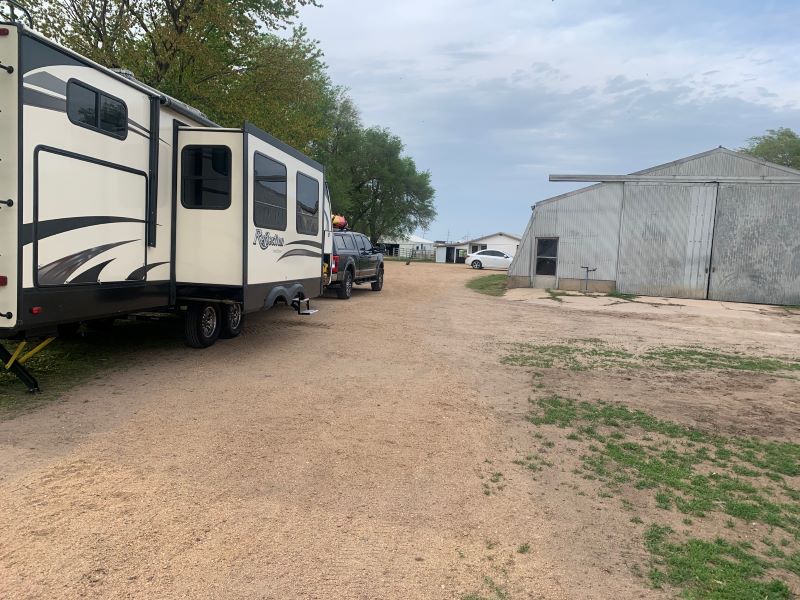
3. Do Boondockers Welcome Locations Have Hookups?
Approximately 75% of Boondockers Welcome locations offer 110V electricity, and some will have water hookups too. Most will not have sewer.
Because you are parking on someone’s land or property, and not in a commercial park, you should not expect to have a conveniently placed pedestal. Typically you just plug into the owner’s outside electrical receptacle which looks like a plug you would plug a regular extension cord into. So be sure you have the proper adapter to go from 50 or 30 amp to 110.
We utilized a Boondockers Welcome once and would do so again. Mike and Susan have used Boondockers Welcome and love it! They enjoy meeting fellow RVers who are kind enough to allow other RVers to stay on their property for free! And they get great advice about cool places to visit in the area from a local.
Be sure to ask a few questions about where you will be parking. Questions such as “How level are the sites?” or “What size of rig can you accommodate?” are all good places to start. Google Earth or Google Satellite are good places to look and see the layout of the land before you arrive. We ended up there for several nights waiting out a storm.
For more info about Boondockers Welcome check out our article, which includes our YouTube Video, called Boondockers Welcome – Free RV Camping Review.
4. What specialized equipment do you need for boondocking?
You will need to purchase some extra equipment if you do plan to spend much time boondocking. What can you use for a power source if you want to park at a Walmart overnight? The battery on your RV can power your lights but not your outlets. Your battery may only last you a few days and if it’s cold, maybe less than that.
We survived the great freeze in Texas last February and thought we needed to replace our batteries. It was just too cold and the battery was having a problem holding a charge. We ended up hooking up our electric cord to our diesel truck and powering our lights that way. Since then, we have added a battery and purchased a generator. And, while we never thought we would boondock much, we are now looking forward to spending more time outside of RV parks.
A generator is a must-have if you want to boondock a lot. You can even run your air conditioner on a generator. You can run the stove, refrigerator, and furnace on propane. If you want to add an alternative power source, add some solar panels. Check out our article called 10 Best Portable and Quiet Generators for Camping for your best options.
When boondocking, make sure your water tanks are full and you can also carry extra water containers for drinking, doing dishes, etc. You can always conserve water while you are off-grid by skipping showers, taking a sponge bath, or using wet wipes to clean up.
Try doing dishes in a tub and keep the water from going into your gray tank. When you head out to camp, make sure your holding tanks are empty so you have as much room as possible. Items such as a composting toilet can help to extend the use of your black tank. LED lights, a water-saving showerhead, or solar power can also keep you off the grid longer.
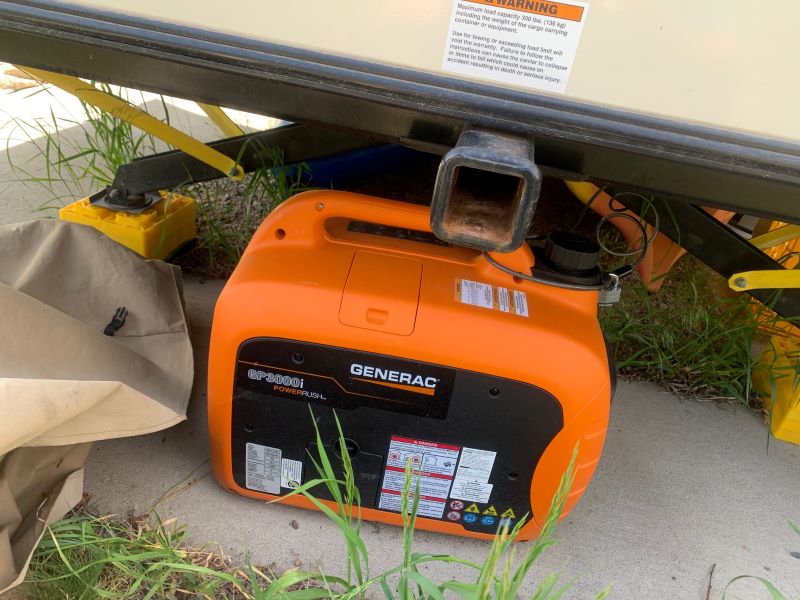
See How Mike and Susan Use Full RV Hookups!
Final Words About RV Hook-Ups
For anyone who is new to RVing, spending time reading articles, watching YouTube videos, and talking with your RV neighbors will help get you up to speed quickly.
Believe me, you learn as you go, and will be up to speed on all the RV terms, and will be helping your fellow RVers in no time.
Related Reading:
– How to Setup Your RV Campsite for Beginners Water, Sewer, Electric, and Gear PLUS a Setup Checklist!
– 15 Best Drinking Water Hoses for Your RV or Camper
– How Do I Support My RV Sewer Hose?
– How to Clean and Store an RV Sewer Hose
Mike Scarpignato – Bio
Mike Scarpignato created RVBlogger.com over five years ago in 2018 to share all we have learned about RV camping.
Mike is an avid outdoorsman with decades of experience tent camping and traveling in his 2008 Gulf Stream Conquest Class C RV and 2021 Thor Challenger Class A motorhome.
We attend RV Shows and visit RV dealerships all across the country to tour and review drivable motorhomes and towable trailers to provide the best evaluations of these RVs in our blog articles and YouTube videos.
We are 3/4-time RVers who created RVBlogger.com to provide helpful information about all kinds of RVs and related products, gear, camping memberships, tips, hacks and advice.
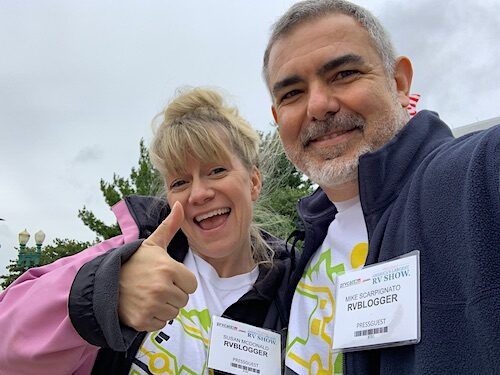

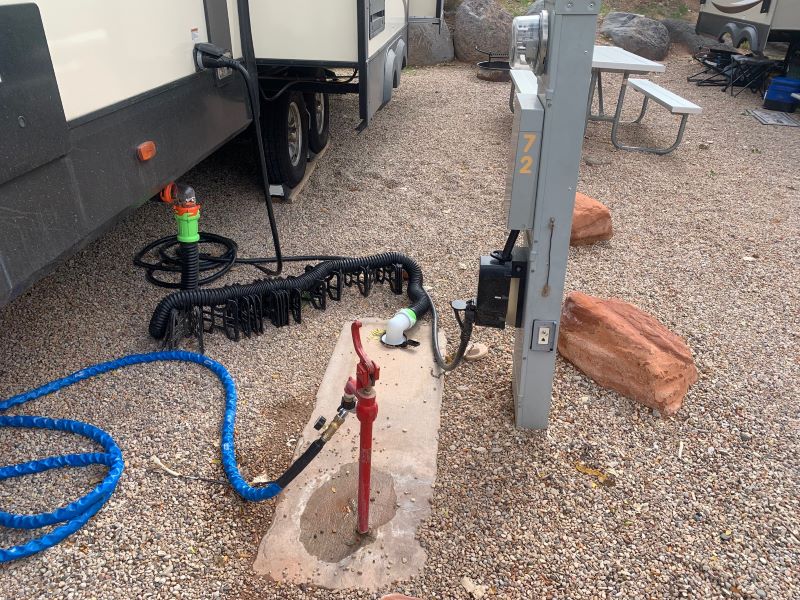
30 amp trailers are 120v. When people say 110v (120v is more accurate) they really mean 15 or 20 amp. That is what a typical household receptacle is. It can be confusing when you mix terms (volt, amp). I really did enjoy this article.